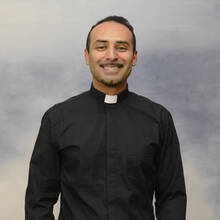Advent is a Time of Testing
Advent is a time of testing, when we can challenge ourselves with this question, “Have my ears been receptive to the Good News?” As we respond individually and as a church, we hear the Gospel anew as we begin the Gospel of Mark. This Sunday’s readings juxtapose the opening lines of Mark’s Gospel with a famous passage from Isaiah. This contrast reveals a deeper complementarity in the Good News they share. Although more than 500 years separate this Sunday’s first reading from the Gospel, they offer the same teaching. They both encourage God’s people to follow God unreservedly, even into the desert, which the biblical tradition understands to be a place of testing.
Justice shall walk before him, and prepare the way of his steps. (Ps 85:14)
How will you set apart time this week to have an honest conversation with God?
Do you hear an invitation to move towards the ambivalent space of the desert?
What is the “good news” you hear proclaimed in today’s readings?
In this Sunday’s first reading, the prophecy of Isaiah reaches a turning point. The prophet has a message of good news for Israelite slaves living in distant Babylon. “In the desert,” cries the seer, “prepare the way of the Lord! Make straight in the wasteland a highway for our God!” (Is 40:3). The “wasteland” is the vast desert between Babylon and Jerusalem, which the prophet now envisions will become a highway that the exiles will be able to traverse with ease. This prophecy was written early in the reign of Cyrus of Persia, the conqueror of Babylon (c. 540s B.C.E.), who made it his policy to free the peoples his predecessors had reduced to captivity. The insight from Isaiah suggests that something dramatic is now happening after decades of living away from Judah. Later in the same prophecy, Isaiah will ask Israel to pay attention to the new thing God is doing through the actions of a foreign ruler, Cyrus.
Helping people pay attention to God’s surprising work was an essential feature of Isaiah’s prophecy. Another surprise in store for Israel was the spiritual fertility of the desert. In the prophet’s mind, it was not merely a “wasteland” that threatened death. Although the desert could be hostile, it was also so much more. In an earlier passage, the prophet foretells: “The wilderness and the dry land shall be glad, the desert shall rejoice and blossom” (Is 35:1). The desert, an ambivalent place of life and death, provides a hard but necessary path for the people of God to renew their intimate relationship with God through history. The desert becomes a place to see God’s hand at work through Cyrus and to renew the convent, that historical relationship of the God of Israel in Israel. Now that the Israelite slaves are free, life might actually seem comfortable in urban, civilized Babylon. In fact, the prophet exhorts, Israel’s true destiny is to journey with God through the wilderness.
This is Mark’s “good news” that begins in the testing space of the desert-wilderness: God now lives among us.
More than an historical call to return to the city of Jerusalem itself, this passage represents a symbolic call for the renewal of hearts and minds as a people of the covenant. This passage does not justify war, population transfers, ethnic hatred, terrorism or any of the other horrors currently taking place in Israel. The deeper call of these readings is an invitation to enter a conversation with God about the manner in which we are presently living. Are we hopeful? Are we trapped in despair? Isaiah’s “desert” is the testing of one’s own heart, where an honest conversation with God may take place.
In this Sunday’s Gospel reading, the evangelist is aware of Isaiah’s dramatic announcement of the “good news” to the people far away from home. The Gospel repeats Isaiah’s message with some adaptations from other sources like Malachi and Exodus. “I am sending my messenger ahead of you,” writes Mark, “he will prepare your way. A voice of one crying out in the desert” (Mk 1:2-3). Mark possesses much the same vision as the prophet Isaiah since his own work builds upon Isaiah’s masterful narrative. Mark’s opening account, which parallels Isaiah’s passage, is an attempt to show that the “good news” about to be announced to the whole world is greater than Isaiah’s call to the city of Jerusalem.
There is movement, too, as Mark describes what is happening by God’s hand. John the Baptist appears “in the desert” and “all the inhabitants of Jerusalem” were going out to him seeking renewal and forgiveness (see Mk 1:4-5). Once again, the people of the covenant engage in an honest conversation with themselves and with God. Once again, the people of the covenant are being tested in the desert, a motif that recurs countless times in the Bible.
The definitive difference in Mark’s passage, however, is that the ongoing conversation with God is about to happen face-to-face, with the one “who will baptize you with the Holy Spirit” (Mk 1:8). This is Mark’s “good news” that begins in the testing space of the desert-wilderness: God now lives among us. This is also the good news we can rediscover during Advent’s testing. In the desert, says Isaiah, prepare!








